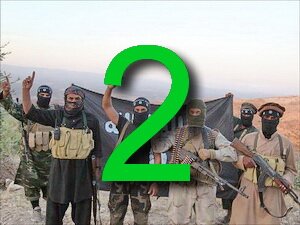
Part 2. Eastern Front: All Quiet or Regrouping of Forces?
Islamist groups and “jihadists” of all colors and directions, fighting in Iraq, Syria, creating a real threat to other countries in the region, have become a natural result of the “policy of containment of the Iranian revolution and the Shiite awakening”, which has been led by Saudi Arabia, supported by the United States since 1980s. Yesterday's operations of American and Saudi intelligence services against the Shiite Tehran and the Soviet presence in Afghanistan now have turned into global terror and expansion of Islamists.
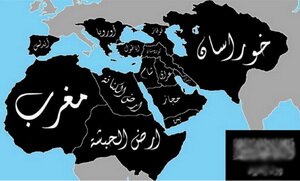 |
|
Militants from the Islamic State of Iraq and the Levant (ISIL) announced the creation of a caliphate in Iraq and Syria, the territories under their control. Vast territory, where militants are going to dominate is black in color. It is the Middle East, North Africa, India, Afghanistan, Pakistan, Central Asian countries, including Kazakhstan, Spain, the Caucasus, and the Mediterranean countries http://blprizrak.livejournal.com/ |
A terrorist transnational corporation has been formed, now turning, as the events in Iraq and Syria show, into the mode of “self-reliance” and establishing its control over the oil fields. Having foothold in Syrian oil fields, it now gets through oil smuggling sale a million dollars a day. And after the capture of two Iraqi oil fields, these revenues have more than tripled.
International news agencies' reports about the events in the Middle East today are more and more like a front-line reports. “The large-scale operation “Protective Edge” against the militants of radical Palestinian groups...”, “Fierce fighting between the armed forces of Islamist groups and their opponents continue in the Libyan capital Tripoli and in Benghazi. Only last week in the fighting were killed more than 220 people, and about 1,100 people were injured”... “Units of the Syrian army, supported by units of the Lebanese “Hezbollah” defeated the rebels' extremist group “Jabhat al-Nusra” in Kalamun, having made them retreat to Lebanon where they captured the border town Arsal”...
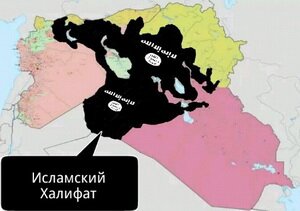 |
|
On 29.06.2014, the territory of the caliphate is more than the territory of Jordan, Lebanon, Israel and Kuwait together http://vk.com/ |
Against this background, “Caliphate” continues to actively expand its borders, capturing new territories and fields of energy carriers, destabilizing the military-political situation in the region.
Thus, just a few days ago militants of extremist Islamist group “Islamic state” for the first time since the outbreak of the civil war in Syria began massive attacks on the positions and objects of the government troops. It happened in the north and north-east of the country, in the provinces of Aleppo, Raqqa, Deir ez-Zor, Hama and Khasaka. The biggest attack was carried out on the army base in the province of Raqqa and positions of the troops in the province of Khasaka. At the same time, the government troops have regained control of the previously captured by militants of IS Shaar gas field in the center of the SAR.
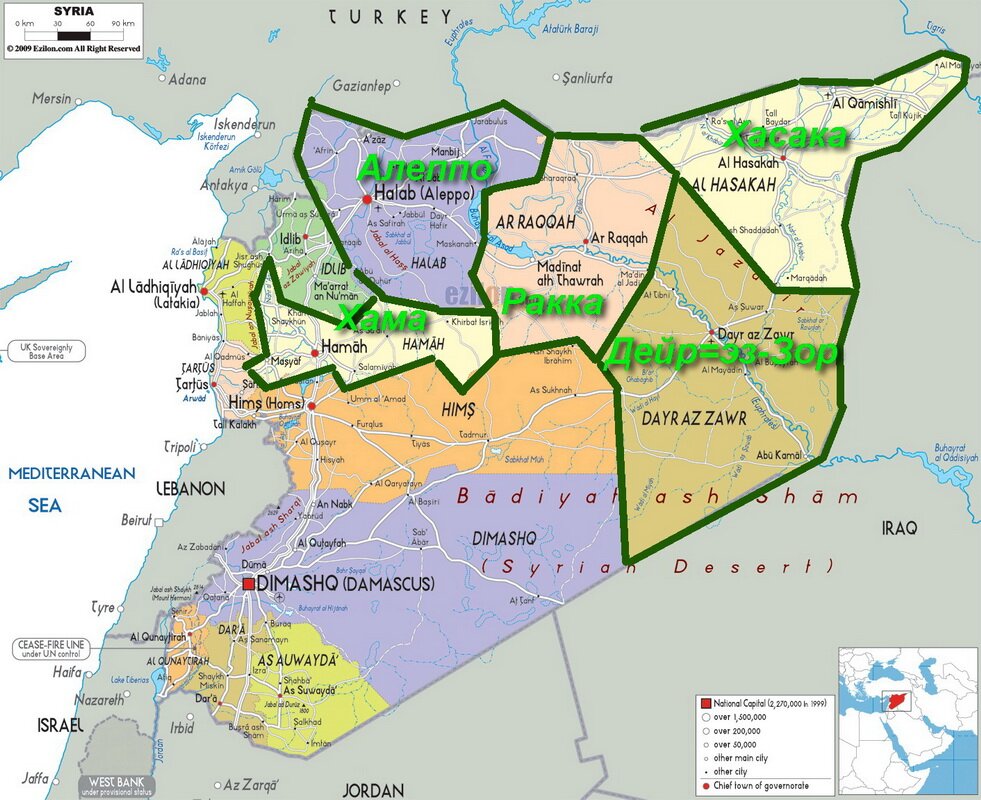
|
|
Militants of extremist Islamist group "Islamic State" launched a massive attack on the position and objects of the Syrian government troops in the provinces of Aleppo, Raqqa, Deir ez-Zor, Hama and Khasaka http://voprosik.net/ |
Fierce fighting between the troops loyal to the Assad regime and the opposition fighters continue around Damascus. At the same time in the suburbs of the capital city rebels of the “Islamic Front” and their allies keep fighting with the forces of the IS. Extremists had to leave some metropolitan suburbs though.
According to information from various sources, there has recently been a significant increase in the number of Syrian rebels, passing to the side of the “Islamic state.”
The situation in Iraq remains quite complicated. In many areas of the country, government forces and Shiite militia groups are fighting against militants of the “Islamic state” and supporting by them armed groups of local Sunni tribes and former Ba'athists. IS militants have stepped up attacks on the positions of the Kurdish forces “Peshmerga” in the north of Iraq, even having managed to capture two oil fields, three cities and the country's largest dam near the town of Mosul. Intense battles are taking place south, west and north-east of Baghdad.
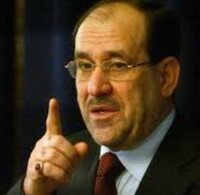 |
| Iraqi Prime Minister Nouri al-Maliki |
Within the country itself, the political situation is getting worse. Bankruptcy of the Prime Minister Nuri al-Maliki's was the main reason for the Iraqi crisis. The policy of maneuvering between Washington and Tehran had brought the country to the brink of split, worsened the already severe conflict between Shiites and Sunnis, not only in Iraq but in the whole region of the Middle East.
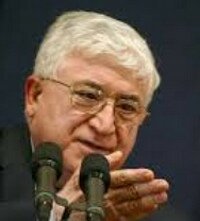 |
| Iraqi President Fuad Masum |
Leading parties in the country made the Prime Minister, Nouri al-Maliki resign. July 24 the Iraqi parliament elected the new president – a representative of the Kurdish bloc – Fuad Masum – moderate politician, maintaining good relations with both the Sunni and Shia. He will replace Jalal Talabani. At the same time, a number of Iraqi political blocs immediately began a campaign to remove F.Masum who has dual citizenship - Iraqi and British. In accordance with Article 18 of the Iraqi Constitution, persons with dual citizenship are not allowed to hold senior government posts.
Currently, the Iraqi government is trying to restore the combat capability of the armed forces. A large number of weapons is being bought in Russia and the United States to “improve the capacity of Iraq's government troops in current ground operations” against the IS.
Washington has temporarily suspended a number of sanctions against Iran. As stated in Washington, it became possible thanks to the progress made in the negotiations on the Iranian nuclear program. According to Washington, Tehran has fulfilled most of the commitments and this fact has reassured the international community. In particular, Iran has stopped production of uranium enriched up to 20%, having given up the needed for this centrifuges; has limited the production of centrifuges to the number necessary for replacement of those out of order; has not been building new plants for uranium enrichment. Besides, according to the USA, IRI has ceased production and testing of reactor fuel in Arak.
In particular, has been cancelled a ban on purchases of petrochemical products from Iran. It is again allowed to supply Iran with spare parts for the repair and ensuring safety of the civil aviation. At the same time, the ban still works regarding individual companies which are on the “black list” of the Treasury Department of the United States. It is specially emphasized that the decisions cover only the period from 20 January to 24 November, 2014.
At the same time in the Iranian capital, the authorities organized cleaning of streets and walls of the houses of anti-American symbolics, posters and leaflets that had appeared there since 1990s. There disappears the anti-American militant rhetoric, slogans like “Death to America!”, have stopped the actions of burning the Stars and Stripes, as all this is not in the spirit of the time and does not help restoration of cooperation.
But the main reason for a change of the course by Tehran and Washington is an active attack of militants of the movement “Islamic state” in Iraq. Terrorists are already tightly controlling nearly a third of Iraq's territory. Under their control are not only oil fields and refineries, but also ancient Shiite shrines: mosques in Karbala and Najaf.
 |
| The head of the "Islamic caliphate" Abu Bakr al-Baghdadi |
And while Americans are more interested in oil, Tehran sincerely fears Sunni militants' destroying Islamic shrines with a thousand year history. “The leader of Muslims everywhere,” Abu Bakr al-Baghdadi has already promised to later transfer the “liberation movement” from Iraq and Syria to Jordan and Lebanon, and further east, to Iran, where act Sunni groups related to ISIL. It is not surprising that the Iranian President Hassan Rouhani has officially stated that Iran is ready to cooperate with the United States in the struggle against radical Sunni groups. “All countries should take part in the common struggle against terrorism. We can cooperate with Americans in order to put an end to the unrest in the Middle East,”- said Rouhani.
The United States did not make statements at such a high level, as they still officially oppose the idea of “turning to Persia”. And Iran, in its turn, cannot give up the stereotype that the role of an antagonist of America strengthens its position in the region. But after the IS militants had announced the creation of a caliphate in most parts of Iraq, the new reality became clear: Iran and the United States need each other more than ever. That is what, by the way, states an analyst at the Washington Institute for Middle East Studies, Dennis Ross. At this, their “steps to meet”, are expected in the economy too: Tehran has already announced the West's having lifted all economic sanctions and having recognized Iran's right to peaceful nuclear energy. Former Secretary of State of the USA Madeleine Albright said the United States soon “may reconsider their views on countries - suppliers of oil”. Washington is already negotiating with Tehran. It is likely the talks will end in signing of the contract on the export of Iranian oil to the United States. Iran can export a lot of oil, while the United States can change their view on its exports - said M. Albright.
So, it is possible that in the nearest future one of the main negative leitmotifs in world politics of 2000s - the confrontation between America and Iran, as a forerunner of the Third World War - may come to naught. However, even the union of the two states in the face of the rapidly growing Islamist threat does not guarantee that the threat can be stopped.
Obviously, the problem cannot be solved by using air strikes against militants of IS, and Washington won't be strengthening the grouping of troops in Iraq. Analysts believe that Tehran is able to reverse the situation by sending its troops into Iraq to protect the Shiite shrines. But without the United States and countries in the region's support, it will not win: time has been lost; the ISIL has become too strong to ignore this.
Will there be a regrouping of forces?
The ISIL's activity and formation of the Caliphate have initiated processes of regrouping of forces in the region. The Moscow-Tehran axis can be joined by Baghdad, face to face with the IS, which means a real threat to its statehood. When in June IS militants stood along the walls of Baghdad, and Washington rejected the Iraqi Prime Minister Nuri al-Maliki's insistent calls for help, Russia and Iran immediately responded and gave Iraqis a direct military and military-technical assistance. This allowed not only to defend the Iraqi capital, but also to throw away from it IS militants to the north and west, having caused the ISIL's heavy losses in men and military equipment.
Syria is also considered a potential participant in such an alliance, since for more than three years (with the direct support of Moscow, Tehran and Baghdad) it successfully resists foreign interference.
Russia has long been ready to lead the would-be alliance. The meeting of the Security Council of the Russian Federation, July 22, 2014, on the theme of Russia's sovereignty and its territorial integrity, was largely a turning point in foreign and defense policy of Russia. From the speech of the President of the Russian Federation, it is clear that Moscow chooses a tough confrontation with the West, NATO and the EU. According to V. Putin, “... The crisis of relations between Russia and the West has come to an absolutely new level, where the tragedy with the Malaysian aircraft becomes just one of its episodes”.
There can be pointed out a number of key signals sent by the Russian leader to the West, the world and the Russian people.
Signal One: reminder that Russia is a nuclear power, and this means that other countries should refrain from saber-rattling near Russian borders.
Signal Two: the pressure on Russia is part of the policy of “Cold War”, directed against it. In reality this means that Russia is preparing for a real reduction of dependence of the national economy and its financial system on adverse external factors, for minimizing any potential to influence from outside on Russia and what is happening within it.
Signal Three: Russia is revising its approach to dialogue with the West. The new policy of Russia - is a decisive rejection of attempts to negotiate with the West, primarily on the common security system. Actually it has been announced: Russia is now on its own and no longer bears any collective responsibility. This means a radical change in the military policy, strengthening of defensive capabilities, including in response to the strengthening of the group of NATO troops in the territory of a number of Eastern European States.
Between Russia and the West there is a real ideological war, based not only on differences in the understanding of values, but also on very fast-growing differences in understanding of the fundamental principles of international law.
According to Russian political scientists and analysts, Putin's plans are much larger than Ukraine, “He hopes that the conflict in the western flank of Russia will sow disunity in Europe, which would weaken the influence of the United States”. The Russian leader wants to build a “Great Europe”, from Portugal to the Pacific Ocean, where Moscow would be one of the centers of influence. “By creating problems similar to the Ukrainian one, which can be solved only by him, Vladimir Putin puts himself at the center of European politics”.
Moscow by all means is trying to maximize disagreements between Baghdad and Washington to its advantage by increasing supplies of arms (combat aircraft, helicopters, aircraft and missile weapons) for the Iraqi army.
The Russian Federation is also trying to compensate for the existing disagreements with the Kingdom of Saudi Arabia on the Syrian conflict and other regional problems through enhanced cooperation in the sphere of nuclear energy.
Moscow's efforts are aimed at achieving the following strategic goals:
- Russian Federation's being ready for actions in support of regional partners;
- increasing military-technical cooperation in the short term;
- strengthening Russia’s influence in Syria and Iraq.
At the moment when Russia is breaking links with Western and Eastern partners, only China manages not to follow in the footsteps of the sanctions lobbied by the USA. What does Beijing count on supporting the policy of Moscow? In what does it see its benefit?
After the collapse of the USSR, Russia actually has lost its importance, and has been increasingly turning into the periphery, in the eyes of both, the United States and most of the world. The current conflict between the United States and Russia over Ukraine is obviously illogical, taking into consideration the differences in the strength and potential of the two sides. Russia cannot claim to world domination. Unlike the Soviet Union, it is not justified by any universal ideology, does not head a bloc of states ruled by the same ideology, and has only a few formal allies. However, this conflict is of concern for the rest of the world.
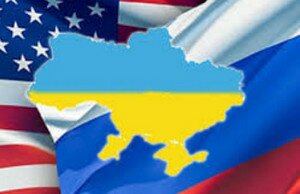 |
| Ukraine's future - its borders, political system and foreign relations - depends largely on the result of the wrestling between the United States and Russia |
No doubt, it is important for Ukraine, part of the territory of which has become a battlefield. The future of the largest country in Europe - its borders, political system and foreign relations - depends largely on the result of the wrestling between the United States and Russia.
Without a doubt, Ukraine will remain internally unified, truly democratic and firmly integrated into European and Euro-Atlantic structures. Putin very much fears that a thriving Ukraine will become an example to follow, not only for Russia.
Ukraine's fate is important for other countries in Eastern Europe, in particular, Moldova and Georgia. Both of them, as well as Ukraine, have signed an association agreement with the European Union; both need to walk on a thin line, in order not to become a battleground between Russia and the West.
Similarly, Russia's partners in the project of the Eurasian Union - Armenia, Belarus, Kazakhstan and Kyrgyzstan - have to carefully align their positions between Moscow and Washington, to avoid the “defense of the Russian-speaking population living in their territories”.
Countries of Central and Western Europe also care about the fate of Ukraine. With the growth of the level of confrontation between the EU and Russia, trade and economic ties will be getting weak. Russia will have to give up the idea of a single space from Lisbon to Vladivostok. While the EU and United States will even more rally both, within the framework of the renewed NATO and with the help of the Partnership of transatlantic trade and investment.
Japan has its own interests: its decision to join the sanctions against Russia, lobbied by the United States, will mean that it neglects the plans to build a strong relationship with Moscow in order to create a counterweight to China in Asia. The USA-Japan alliance will resume, as well as Japan's position in this alliance.
South Korea will limit trade with Russia, potentially causing a decrease of support to Moscow on the issue of the divided Korean Peninsula. It will have no choice.
As a result, the conflict between the United States and Russia will lead to strengthening the positions of the USA in relation to its European and Asian allies, and to a much less favorable situation for Russia anywhere in Eurasia.
Now this whole mosaic has only one exception - China. The sharp decline in Russia's economic ties with advanced countries leaves China as a powerful economy outside the sanctions regime. This increases its role and importance for Russia, which fact promises the Chinese a greater access to the Russian energy sector, natural resources, military equipment and technologies, and most importantly - to the territories.
Objectively, China profits neither from a strong nor from a weak Russia. For Beijing, it is important that Russia remained a stable strategic partner in the backyard and a natural resource base. A sort of the world’s fuel filling station.
There is no doubt that Russia will be billed for its actions in Ukraine. For the United States and its allies the question remains, what will be the results of the recovery of the prices for themselves.
FORECASTS:
- further aggravation of the situation in Iraq and Syria (territory of the Caliphate);
- Kurdistan’s preparations for proclaiming independence through a referendum;
- Russia has got stuck in the Ukrainian crisis, on which it has to spend almost all of the already small foreign policy resource. This will lead to the collapse of the “unregenerated Empire”;
- Tehran for some time will be forced to act on several foreign policy “fronts”, while remaining under the influence of sanctions, but will be able to strengthen its positions and to more actively influence the development of the situation in the region.
To be continued

